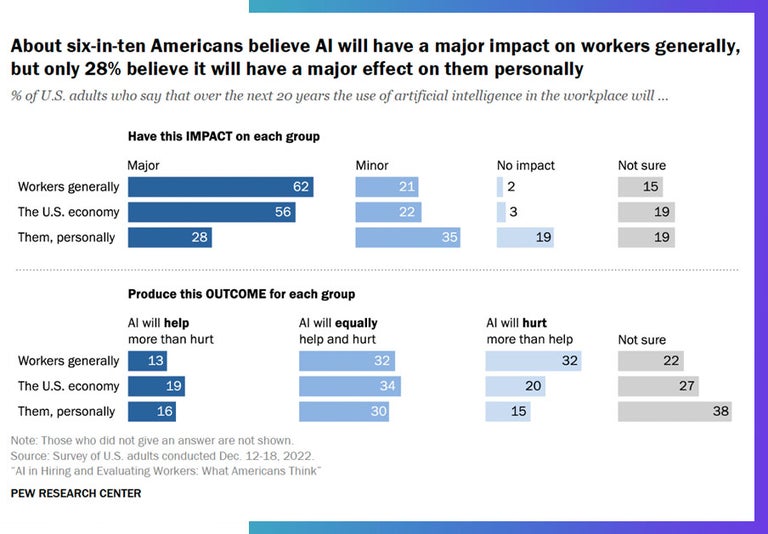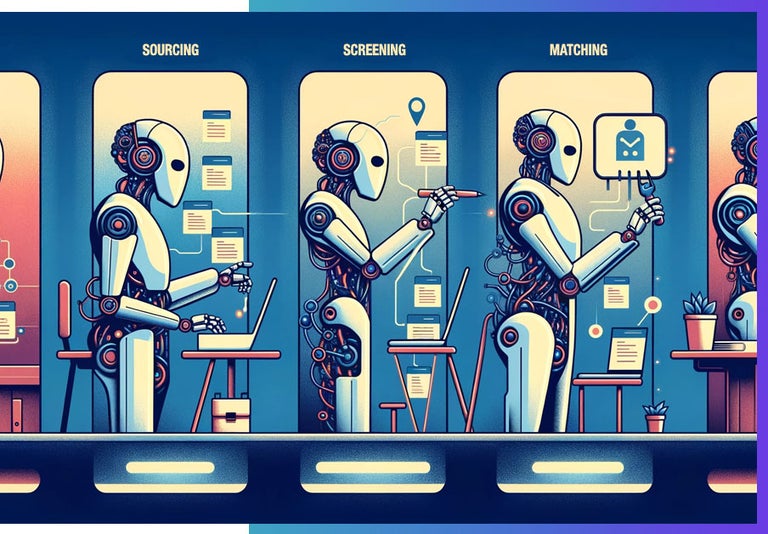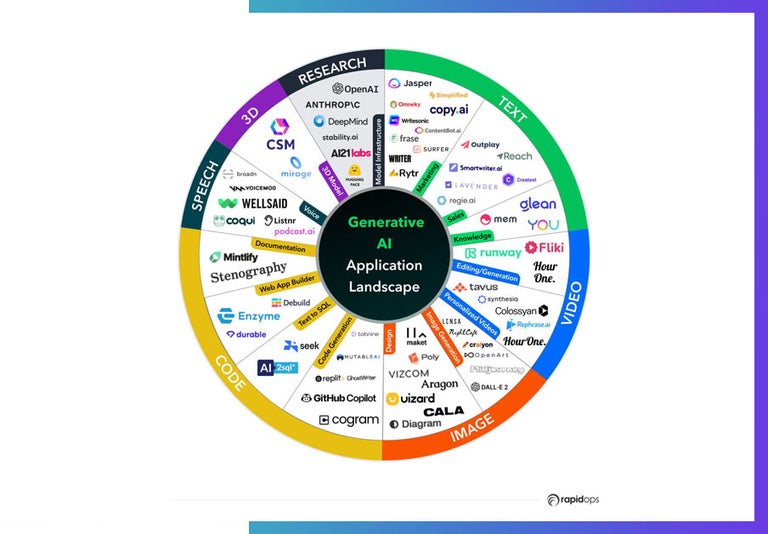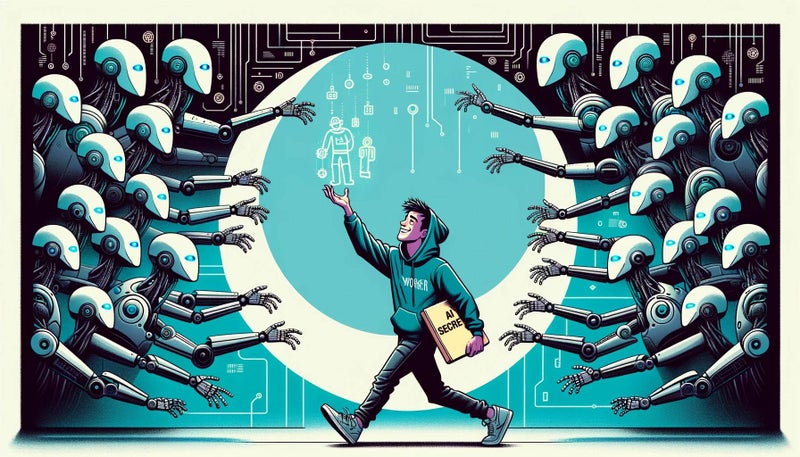Contents
- What is AI Recruiting? (From a Job Search Perspective)
- How AI Recruitment Impacts Your Job Hunt
- The Job Hunt: You’re Not Being Hired (Here’s Why)
- Future Proofing Your Job: Level Up Your AI Skills
- The Augmented Future of AI
AI recruiting has completely rewritten the job search playbook. It’s 2024 - either you get informed, or you get overlooked. What if I told you your next job opportunity is on the line? That if you keep ignoring (or minimizing) AI - your career in tech is about to nosedive?
People are losing their jobs over AI – in more ways than one.
You need to hear it.
Resistance to new technologies is normal, but once in every generation something so ground-breaking comes along that it reshuffles what matters, and what doesn’t.
This is your early morning wake-up call: AI isn’t coming. It’s here.
It’s so big that this moment in tech history will make or break your career.
It’s as transformative as any tech that arose during the first three legs of the industrial revolution. And just look at what people said about those:
- The steam engine: Unsafe, dangerous and defiant of the natural order.
- Electricity: We won’t need it.
- The Internet: It won’t make much of a difference.
Sound familiar? It’s wild how wrong they were.
AI marks the rise of the fourth revolution - and it will create and destroy jobs for the rest of our natural lives. So, you have a choice, and I’m here to help you make it.
Either you seize this opportunity and land one of the best jobs of your life – or you become one of thousands who failed to upskill, will lose their jobs, and struggle endlessly to find another.
I’ve seen it happening in person, with friends. People who would be amazing at a job, but can’t get an interview. Or, landing five interviews in an afternoon because they used AI’s help.
The gap is widening.
What is AI Recruiting? (From a Job Search Perspective)
When on the hunt for a new job, you apply for the positions that look good to you online.
This often means long hours searching, revamping your resume, and writing insane cover letters that you think about late at night – in the dark - as you lie in bed.
Without the right AI know-how, the moment you click ‘apply’ the odds aren’t in your favor.
Suddenly, you’re in a Hunger Games styled arena where your application is automatically eliminated. You may never know what got you – poison perhaps, or tracker jacker wasps.
You didn’t stand a chance.
And it’s because artificial intelligence has been built into the hiring process, to make it faster, easier and better for recruiters. It streamlines and automates how they find, assess and place you.
Knowing how they do this is KEY to your survival.
- It’s 2024, the latest studies by Zippia report that AI is used by recruiters 65% of the time, with 35-45% of all companies using the technology already. Nearly 100% of Fortune 500 companies are using AI to hire people.
- 79% of recruiters believe that people won’t have to be involved in the recruitment process, soon.
In the US, six in ten people believe AI will have a major impact – but only 28% of them think it’s going to impact them on a personal level (Pew Research).

So, in quick review - AI is far more important than you think.
How AI Recruitment Impacts Your Job Hunt
Hiring managers everywhere are flavoring their pipelines with the tastiest AI they can find. The goal is to use AI to reduce time and resource investment in the hiring process.
Recruiters in tech are overwhelmed and desperate to tap into the power of AI hiring to find better candidates, faster.
To achieve this, they’re using artificial intelligence in 3 key ways:
1. AI-Powered Sourcing
Finding perfect-fit candidates is an age-old challenge for hiring managers.
With AI tools, they’ve gone from limited manual submissions, to using platforms that actively search the internet for you, based on keywords.
These days candidate sourcing looks at social media, websites, job boards and other data sources to find candidates to actively approach.
The most efficient way though, is through a platform that candidates intentionally exist on, for discovery. Hiring managers partner with the platform, who then source the right candidates for them based on their specific criteria.
Prime is an example of a highly vetted candidate platform that uses AI sourcing.
The switch: From passive to active candidate discovery.

2. AI Resume Screening
A recent study has shown that AI screening saves recruiters 75% of resume screening time.
Hiring managers have always struggled with resume reviews, dedicating a few shoddy seconds to someone’s painstakingly drafted resume to determine job suitability.
Good riddance to that totally inefficient waste of time!
Instead, they’re using AI to screen resumes, which means algorithms are doing the heavy lifting.
They look for keywords, skills and markers the employer has deemed important for job fit. One position with hundreds of applicants becomes a tidy shortlist for humans to review.
Remember applicant tracking systems (ATS)? Well, 79% of organizations have integrated AI directly into these existing pipelines.
The switch: From manual resume screening to automated AI screening.
3. AI Candidate Matching
Every employer is unique and wants a specific type of candidate, with specific skills.
Based on their unique needs, they’ll use AI to match them with job candidates who are most likely to meet them.
It really is like the Tinder of hiring, but instead of traits, skills are the currency. This is why there’s been such a boom in skills-based hiring.
Skills are something that can be proved in a test environment, which is valuable to recruiters.
No-one has time to test every candidate individually – especially in remote jobs when the entire world is your workforce. Recommendation engines simplify this process for everyone.
Candidate matching reduces time-to-fill which means better hires faster.
Even if you optimize your chances with AI you still face:
- An enormous amount of competition
- A devastatingly accurate shortlist of worthy candidate peers
- Structured interviews in the final rounds
The Job Hunt: You’re Not Being Hired (Here’s Why)
That’s a lot of change to manage. But the good news is that you can adapt just as easily.
So, how can you dial into AI recruiting to improve the way you apply for a job?
Here’s the playbook that will help you make the mental (and practical) switch.
> From smart and funny to technically searchable:
Your resume and cover letter need to be reframed, as tools for AI AT systems. Their only purpose is to get you on that coveted shortlist. That means dropping any creative, funny or entertaining language and focusing on – you guessed it – keywords.
- Simple formatting in a document / no design
- Research industry keywords and use them / don’t ignore common terms
- Add a skills section and populate it well / don’t leave off key skills
- Align job titles with industry norms / don’t be afraid to tweak your titles
- Test your resume in an ATS simulator / don’t leave it to chance
Better yet, ditch your resume altogether and apply for jobs that are skills and merit-based.
> From personal charm to practical presence:
Back when dial-up internet sounded like a smoke alarm, you could land an interview coincidentally and charm your way to being hired. That’s infinitely less likely to happen now.
Don’t rely on early-stage in-person charisma and fail to exist on the internet. You have to have a professional presence there if you’re serious about making the cut.
- A brilliant portfolio of your best work (Yes, use GenAI to help you!)
- Showcase your results over your work (GenAI can create pretty things, but not results)
- Have a website, and a social media presence (Again, AI can help)
> From crapshoot to fish in a barrel:
Spending time on LinkedIn, Indeed and the myriad of other job sites is okay (if you have time to burn on once-off job applications). But is it the best way to be found? Absolutely not.
In the age of AI, you should shift from the gamble of direct application to the opportunity of being part of a tech platform.
The benefits are clear – if the platform is top-notch, it will attract exceptional tech companies and high paying jobs. You’ll only have to be tested once and will be eligible for a wider range of suitable positions. And you will be discoverable within that platform and be easy to match.
Prime is an AI platform that holds 7 million of tech’s top 1% talent. Everyone there has done the CCAT test, passed skills tests, and proven that they are a quality hire.
Once you’re there, you’re on the A-list.
> From education to skill surfacing:
Where you went to school and what qualifications you have are relevant, but not as important as they once were. Skills matter more these days. That’s because AI needs to be used by smart people who have skills over and above what AI can create. And because AI searches by skill.
When applying for jobs, your skills should be front and center. Even better would be to educate yourself so that you can pass skills tests. Verifying your skills is a great way to stand out.
- Work on making your skills verifiable
- Work on reducing test-taking anxiety and become good at it
- Take skills-tests seriously and work to score well
- Join platforms that give you the chance to be tested
Side note: Some people in tech point blank refuse to do skills tests. If you’re one of these people, keep in mind that a lot of people once refused to have websites or LinkedIn pages too. A tipping point will come, and you will be behind when it does.
Pre-employment tests aren’t meant to be easy to pass. They’re meant to eliminate candidates. So instead of a 95% pass rate, they aim to eliminate 95% of candidates.
Be one of the few who pass!
> From sheer luck to intentional selection:
Resumes aren’t piling up on someone’s desk anymore. And likability in remote work is less of a critical factor (as long as soft skills exist) – so luck is much less of a hiring factor than it once was. You’re not likely to be the first ‘half-way decent’ candidate, when everyone is top-notch.
To be competitive in AI recruiting, you must focus on being intentionally selected. If you do get through the AI AT systems, then make sure you nail the interview.
- Learn to be good on camera and in a Zoom call
- Research the company interviewing you (and ask questions about it)
- Keep learning, evolving and upskilling
- Stay up-to-date on industry keywords / terms
- Publish industry-related content online fairly often

Future Proofing Your Job: Level Up Your AI Skills
It’s not just how you GET your job, it’s how you will DO your job.
Last year I wrote: Cognition is king.
I spoke about the third age of the internet and how AI-savvy candidates will build the future. And since then, there has been an even bigger boom in AI talent acquisition.
Dr Koutroumpis the Director of the Oxford Martin Programme on Technological and Economic Change has written about the phenomenal rise in demand for AI skills.
Every day, there are new job titles, new job specifications, and new rules. He says detailed skill requirements are now the basis for recruitment (not education and experience).
- There has been a 5-fold increase in demand for AI skills since 2015.
- Demand for generative AI skills exploded by 1848% in 2023.
The best thing you can do for your career right now, is to get familiar with the broad range of AI tools available for you to use. Pick a few, and learn how to use them like a pro.
Check out these Gen AI tools (RapidOps):

The Augmented Future of AI
Everywhere I look I see the AI gap widening. Companies are scrambling to adopt the latest AI toolsets, processes and talent. It’s a land grab, which means it’s an opportunity for you.
You’ve taken an important first step.
By shifting how you see and respond to the AI recruiting space, you’ll be better positioned to benefit the next time you apply for a job online. Because you understand how it works.
It demands action, not passive hopes and dreams.
- Optimize how you apply for jobs (platform-first)
- Optimize - or ditch - your resume (keywords and terms matter)
- Improve your skills and do skills tests for verification (the more the merrier)
- Work on your online presence to be easy to find (contribute industry knowledge)
- Understand the importance of landing an interview (and be on point)
- Upskill your AI knowledge (every month)
Don’t wait to feel the keen sting of being ignored.
Instead, use AI to augment your job and enhance your chances of landing bigger, better opportunities. Soon, everyone will be a centaur or a cyborg on this jagged frontier.
You’ll either divide and delegate with AI, or you’ll completely integrate it in your tasks. But ignoring it completely, will be just as foolish as someone from the 1920’s saying, ‘we don’t need electricity.’
Imagine what your career could become if - when AI goes looking – it finds you?
May the odds be ever in your favor, friends.








